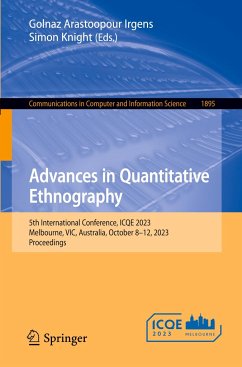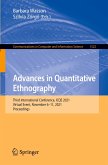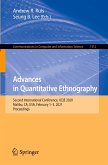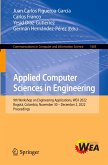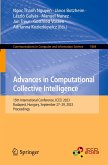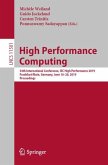Advances in Quantitative Ethnography
5th International Conference, ICQE 2023, Melbourne, VIC, Australia, October 8-12, 2023, Proceedings
Herausgegeben:Arastoopour Irgens, Golnaz; Knight, Simon
Advances in Quantitative Ethnography
5th International Conference, ICQE 2023, Melbourne, VIC, Australia, October 8-12, 2023, Proceedings
Herausgegeben:Arastoopour Irgens, Golnaz; Knight, Simon
- Broschiertes Buch
- Merkliste
- Auf die Merkliste
- Bewerten Bewerten
- Teilen
- Produkt teilen
- Produkterinnerung
- Produkterinnerung
This book constitutes the refereed proceedings of the 5th International Conference on Advances in Quantitative Ethnography, ICQE 2023, held in Melbourne, VIC, Australia, during October 8-12, 2023. The 33 full papers included in this book were carefully reviewed and selected from 39 submissions. They were organized in topical sections as follows: understanding learners and learning; society, culture, identity, and justice; and advances in QE methodologies.
Andere Kunden interessierten sich auch für
![Advances in Quantitative Ethnography Advances in Quantitative Ethnography]() Advances in Quantitative Ethnography76,99 €
Advances in Quantitative Ethnography76,99 €![Advances in Quantitative Ethnography Advances in Quantitative Ethnography]() Advances in Quantitative Ethnography38,99 €
Advances in Quantitative Ethnography38,99 €![Applied Computer Sciences in Engineering Applied Computer Sciences in Engineering]() Applied Computer Sciences in Engineering68,99 €
Applied Computer Sciences in Engineering68,99 €![Applied Computer Sciences in Engineering Applied Computer Sciences in Engineering]() Applied Computer Sciences in Engineering68,99 €
Applied Computer Sciences in Engineering68,99 €![Advances in Computational Collective Intelligence Advances in Computational Collective Intelligence]() Advances in Computational Collective Intelligence91,99 €
Advances in Computational Collective Intelligence91,99 €![High Performance Computing High Performance Computing]() High Performance Computing50,99 €
High Performance Computing50,99 €![Emerging Technologies and the Digital Transformation of Museums and Heritage Sites Emerging Technologies and the Digital Transformation of Museums and Heritage Sites]() Emerging Technologies and the Digital Transformation of Museums and Heritage Sites65,99 €
Emerging Technologies and the Digital Transformation of Museums and Heritage Sites65,99 €-
-
-
This book constitutes the refereed proceedings of the 5th International Conference on Advances in Quantitative Ethnography, ICQE 2023, held in Melbourne, VIC, Australia, during October 8-12, 2023.
The 33 full papers included in this book were carefully reviewed and selected from 39 submissions. They were organized in topical sections as follows: understanding learners and learning; society, culture, identity, and justice; and advances in QE methodologies.
The 33 full papers included in this book were carefully reviewed and selected from 39 submissions. They were organized in topical sections as follows: understanding learners and learning; society, culture, identity, and justice; and advances in QE methodologies.
Produktdetails
- Produktdetails
- Communications in Computer and Information Science 1895
- Verlag: Springer / Springer Nature Switzerland / Springer, Berlin
- Artikelnr. des Verlages: 978-3-031-47013-4
- 1st ed. 2023
- Seitenzahl: 520
- Erscheinungstermin: 22. Oktober 2023
- Englisch
- Abmessung: 235mm x 155mm x 28mm
- Gewicht: 779g
- ISBN-13: 9783031470134
- ISBN-10: 3031470133
- Artikelnr.: 68979429
- Herstellerkennzeichnung
- Springer-Verlag GmbH
- Tiergartenstr. 17
- 69121 Heidelberg
- ProductSafety@springernature.com
- Communications in Computer and Information Science 1895
- Verlag: Springer / Springer Nature Switzerland / Springer, Berlin
- Artikelnr. des Verlages: 978-3-031-47013-4
- 1st ed. 2023
- Seitenzahl: 520
- Erscheinungstermin: 22. Oktober 2023
- Englisch
- Abmessung: 235mm x 155mm x 28mm
- Gewicht: 779g
- ISBN-13: 9783031470134
- ISBN-10: 3031470133
- Artikelnr.: 68979429
- Herstellerkennzeichnung
- Springer-Verlag GmbH
- Tiergartenstr. 17
- 69121 Heidelberg
- ProductSafety@springernature.com
Understanding Learners and Learning.- Do Learners Appreciate Adaptivity? An Epistemic Network Analysis of How Learners Perceive Adaptive Scaffolding.- Cracking the Code of Learning Gains: Using Ordered Network Analysis to Understand the Influence of Prior Knowledge.- Decoding Player Behavior: An Epistemic Network Analysis of the Reasons for Player Quitting Using Log Data from the Puzzle Game Baba is You.- Impact of Agent Language on Student Language in the Structures of Language Connections.- Characterising Individual-level Collaborative Learning Behaviours using Ordered Network Analysis and Wearable Sensors.- Understanding Group Dynamics During Synchronous Collaborative Problem-solving Activities: An Epistemic Network Approach.- Cultural Impact on a Global Virtual STEM Project.- From We to Me: Moving towards an examination of self identity in an online, global, collaborative, learning environment.- Investigating the Relationship Between Programming Experience and Debugging Behaviors in an Introductory Computer Science Course.- To Ban or Embrace - Students' perceptions towards adopting advanced AI Chatbots in Schools.- Using Epistemic Network Analysis to Explore Flexibility and Development of Termite Fishing Techniques in Nigeria-Cameroon Chimpanzees (Pan troglodytes ellioti).- Society, Culture, Identity, and Justice.- Examining Motivating Language in Commencement Speech Using Epistemic Network Analysis.- Examining the Discourse of Effective Science Communicators Using Epistemic Network Analysis.- Examining Student Conceptualizations of Intersectional Identities Across Global Contexts via Epistemic Network Analysis (ENA).- Asian American Education Literature Before and After Covid-19.- Examining Student Conceptualizations of Intersectional Identities Across Global Contexts via Epistemic Network Analysis (ENA).- Using Epistemic Network Analysisto Understand the Intersectional Experiences of Teachers of Color in White-Dominated Education Institutions (updated).- Conceptualizing Theoretical Frameworks for Post-Colonial Education for Kisii K-12, Kenya.- The Stories We Tell: Uncovering Hidden Narratives in History Textbooks through Epistemic Network Analysis.- Theory and tool-building for a science of dysfunctional political discourse.- Envisioning Latinx Narratives: Exploring Mexican and Honduran Immigrant Perspectives Using Epistemic Networks by Geospatial Location.- Interaction of Diagnostic Criteria in the Narratives of Patients with Borderline Personality Disorder.- Leveraging Epistemic Network Analysis in Monologic Interviews to Explore Cultural Integration In Global Organizations.- Advances in QE Methodologies.- Thin Data, Thick Description: Modeling Socio-Environmental Problem-Solving Trajectories in Localized Land-Use Simulations.- Developing Nursing Students' Practice Readiness with Patient First: A Transmodal Analysis.- Combining Automatic Coding and Instructor Input to Generate ENA Visualizations for Asynchronous Online Discussion.- A Case for (Inter)Action: The Role of Log Data in QE.- Approaches to Code Selection for Epistemic Networks.- Negative Reversion: Toward Intelligent Co-raters for Coding Qualitative Data in Quantitative Ethnography.- Automated Code Discovery via Graph Neural Networks and Generative AI.- A Lightweight Interactive Regex Generator for Qualitative Coding in Quantitative Ethnography.- From nCoder to ChatGPT: From Automated Coding to Refining Human Coding.
Understanding Learners and Learning.- Do Learners Appreciate Adaptivity? An Epistemic Network Analysis of How Learners Perceive Adaptive Scaffolding.- Cracking the Code of Learning Gains: Using Ordered Network Analysis to Understand the Influence of Prior Knowledge.- Decoding Player Behavior: An Epistemic Network Analysis of the Reasons for Player Quitting Using Log Data from the Puzzle Game Baba is You.- Impact of Agent Language on Student Language in the Structures of Language Connections.- Characterising Individual-level Collaborative Learning Behaviours using Ordered Network Analysis and Wearable Sensors.- Understanding Group Dynamics During Synchronous Collaborative Problem-solving Activities: An Epistemic Network Approach.- Cultural Impact on a Global Virtual STEM Project.- From We to Me: Moving towards an examination of self identity in an online, global, collaborative, learning environment.- Investigating the Relationship Between Programming Experience and Debugging Behaviors in an Introductory Computer Science Course.- To Ban or Embrace - Students' perceptions towards adopting advanced AI Chatbots in Schools.- Using Epistemic Network Analysis to Explore Flexibility and Development of Termite Fishing Techniques in Nigeria-Cameroon Chimpanzees (Pan troglodytes ellioti).- Society, Culture, Identity, and Justice.- Examining Motivating Language in Commencement Speech Using Epistemic Network Analysis.- Examining the Discourse of Effective Science Communicators Using Epistemic Network Analysis.- Examining Student Conceptualizations of Intersectional Identities Across Global Contexts via Epistemic Network Analysis (ENA).- Asian American Education Literature Before and After Covid-19.- Examining Student Conceptualizations of Intersectional Identities Across Global Contexts via Epistemic Network Analysis (ENA).- Using Epistemic Network Analysisto Understand the Intersectional Experiences of Teachers of Color in White-Dominated Education Institutions (updated).- Conceptualizing Theoretical Frameworks for Post-Colonial Education for Kisii K-12, Kenya.- The Stories We Tell: Uncovering Hidden Narratives in History Textbooks through Epistemic Network Analysis.- Theory and tool-building for a science of dysfunctional political discourse.- Envisioning Latinx Narratives: Exploring Mexican and Honduran Immigrant Perspectives Using Epistemic Networks by Geospatial Location.- Interaction of Diagnostic Criteria in the Narratives of Patients with Borderline Personality Disorder.- Leveraging Epistemic Network Analysis in Monologic Interviews to Explore Cultural Integration In Global Organizations.- Advances in QE Methodologies.- Thin Data, Thick Description: Modeling Socio-Environmental Problem-Solving Trajectories in Localized Land-Use Simulations.- Developing Nursing Students' Practice Readiness with Patient First: A Transmodal Analysis.- Combining Automatic Coding and Instructor Input to Generate ENA Visualizations for Asynchronous Online Discussion.- A Case for (Inter)Action: The Role of Log Data in QE.- Approaches to Code Selection for Epistemic Networks.- Negative Reversion: Toward Intelligent Co-raters for Coding Qualitative Data in Quantitative Ethnography.- Automated Code Discovery via Graph Neural Networks and Generative AI.- A Lightweight Interactive Regex Generator for Qualitative Coding in Quantitative Ethnography.- From nCoder to ChatGPT: From Automated Coding to Refining Human Coding.

